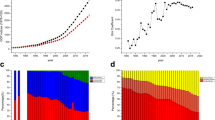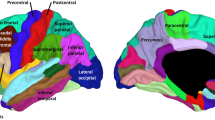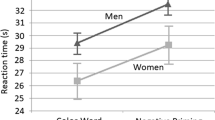Abstract
A cross-cultural quantitative review of contemporary findings of gender differences in variability in verbal, mathematical, and spatial abilities was conducted to assess the generalizability of U.S. findings that (a) males are more variable than females in mathematical and spatial abilities, and (b) the sexes are equally variable in verbal ability. No consistent gender differences (variance ratios) were found across countries in any of the three broad ability domains. Instead, males were more variable than females in some nations and females were more variable than males in other nations. Thus, the well-established U.S. findings of consistently greater male variability in mathematical and spatial abilities were not invariant across cultures and nations.
Similar content being viewed by others
References
Becker, B. J., & Hedges, L. V. (1984). Meta-analysis of cognitive gender differences: A comment on an analysis by Rosenthal and Rubin.Journal of Educational Psychology, 76 583–587.
Benbow, C. P., & Stanley, J. C. (1980). Sex differences in mathematical reasoning ability ability: Fact or artifact?Science, 210 1262–1264.
Benbow, C. P., Stanley, J. C. (1983). Sex differences in mathematical reasoning ability: More facts.Science, 222 1029–1031.
Born, M. Ph., Bleichrodt, N., & Van Der Flier, H. (1987). Cross-cultural comparison of sex related differences on intelligence tests: A meta-analysis.Journal of Cross-Cultural Psychology, 18 283–314.
Buss, D. M. (1989). Sex differences in human mate preferences: Evolutionary hypotheses tested in 37 cultures.Behavioral and Brain Sciences, 12 1–49.
Cohen, J. (1977).Statistical power analysis for the behavioral sciences (rev. ed.). New York: Academic Press.
Ellis, H. (1894).Man and woman. London: Walter Scott.
Feingold, A. (1988). Cognitive gender differences are disappearing.American Psychologist, 43 95–103.
Feingold, A. (1990). Gender differences in effects of physical attractiveness on romantic attraction: A comparison across five research paradigms.Journal of Personality and Social Psychology, 59 981–993.
Feingold, A. (1992a). Cumulation of variance ratios.Review of Educational Research, 62 433–434.
Feingold, A. (1992b). Gender differences in mate selection preferences: A test of the parental investment model.Psychological Bulletin, 112 125–139.
Feingold, A. (1992c). Sex differences in variability in intellectual abilities: A new look at an old controversy.Review of Educational Research, 62 61–84.
Feingold, A. (1992d). The greater male variability hypothesis: Science vs. politics.Review of Educational Research, 62 89–90.
Feingold, A. (1993a). Cognitive gender differences: A developmental perspective.Sex Roles, 29 91–112.
Feingold, A. (1993b). Joint effects of gender differences in central tendency and gender differences in variability.Review of Educational Research, 63 106–109.
Harnisch, D. L., Steinkamp, M. W., Tsai, S.-L., & Walberg, H. J. (1986). Cross-national differences in mathematics attitude and achievement among seventeen-year-olds.International Journal of Educational Development, 6 233–244.
Hedges, L. V., & Friedman, L. (1993). Gender differences in variability in intellectual abilities: A reanalysis of Feingold's results.Review of Educational Research, 63 94–105.
Hedges, L. V., & Olkin, I. (1985).Statistical methods for meta-analysis. Orlando, FL; Academic Press.
Hollingworth, L. S. (1914). Variability as related to sex differences in achievement: A critique.American Journal of Sociology, 19 510–530.
Jensen, A. R. (1971). The race x sex x ability interaction. In R. Cancro (Ed.),Intelligence: Genetic and environmental influences. New York: Grune and Stratton.
Johnson, D. D. (1973–1974). Sex differences in reading across cultures.Reading Research Quarterly, 1 67–86.
Kissane, B. V. (1986). Selection of mathematically talented students.Educational Studies in Mathematics, 17 221–241.
Linn, M. C., & Hyde, J. S. (1989, November). Gender, mathematics, and science.Educational Researcher, 18 17–27.
Maccoby, E. E., & Jacklin, C. N. (1974).The psychology of sex differences. Stanford, CA: Stanford University Press.
McNemar, Q., & Terman, L. M. (1936). Sex differences in variational tendency.Genetic Psychology Monographs, 18 1–65.
Noddings, N. (1992). Variability: A pernicious hypothesis.Review of Educational Research, 62 85–88.
Pearson, K. (1897).Chances of death. (Vol. 1). London: Arnold.
Rosenthal, R. (1984).Meta-analytic procedures for social research. Beverly Hills, CA: Sage.
Shields, S. A. (1975). Functionalism, Darwinism, and the psychology of women: A study in social myth.American Psychologist, 30 739–754.
Stanley, J. C., Huang, J., & Zu, X. (1986). SAT-M scores of highly selected students in Shangahai tested when less than 13 years old.College Board Review, 140 10–29.
Steinkamp, M. W., Harnsich, D. L., Walberg, H. J., & Tsai, S. (1985). Cross-national gender differences in mathematics attitude and achievement among 13-year-olds.Journal of Mathematical Behavior, 4 259–277.
Thorndike, E. L. (1914).Educational Psychology (Vol. 3). New York: Teachers College, Columbia University.
Author information
Authors and Affiliations
Additional information
I would like to thank Robert Linn for providing me with the British norms for the Differential Aptitude Tests and Julian Stanley for his comments on a draft of this article.
Rights and permissions
About this article
Cite this article
Feingold, A. Gender differences in variability in intellectual abilities: A cross-cultural perspective. Sex Roles 30, 81–92 (1994). https://doi.org/10.1007/BF01420741
Issue Date:
DOI: https://doi.org/10.1007/BF01420741




